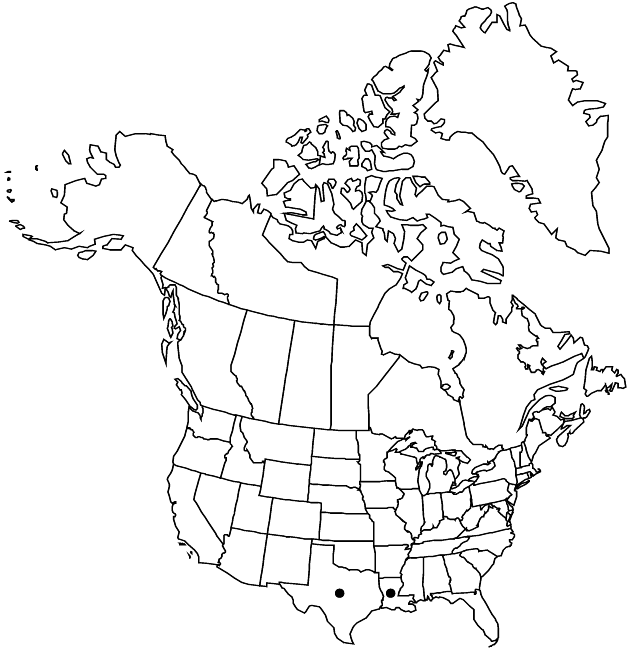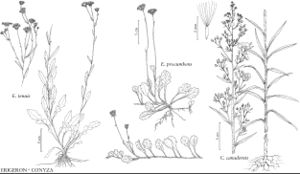Difference between revisions of "Erigeron procumbens"
Sida 11: 249. 1985.
FNA>Volume Importer |
imported>Volume Importer |
||
| (3 intermediate revisions by 2 users not shown) | |||
| Line 8: | Line 8: | ||
}} | }} | ||
|common_names=Corpus Christi fleabane | |common_names=Corpus Christi fleabane | ||
| + | |special_status={{Treatment/ID/Special_status | ||
| + | |code=F | ||
| + | |label=Illustrated | ||
| + | }} | ||
|basionyms={{Treatment/ID/Basionym | |basionyms={{Treatment/ID/Basionym | ||
|name=Aster procumbens | |name=Aster procumbens | ||
|authority=Houstoun ex Miller | |authority=Houstoun ex Miller | ||
| + | |rank=species | ||
|publication_title=Gard. Dict. ed. | |publication_title=Gard. Dict. ed. | ||
|publication_place=8, Aster no. 32, plate 58, fig. 2. 1768 | |publication_place=8, Aster no. 32, plate 58, fig. 2. 1768 | ||
| Line 17: | Line 22: | ||
|name=Erigeron myrionactis | |name=Erigeron myrionactis | ||
|authority=Small | |authority=Small | ||
| + | |rank=species | ||
}} | }} | ||
|hierarchy=Asteraceae;Asteraceae tribe Astereae;Erigeron;Erigeron procumbens | |hierarchy=Asteraceae;Asteraceae tribe Astereae;Erigeron;Erigeron procumbens | ||
| Line 40: | Line 46: | ||
-->{{#Taxon: | -->{{#Taxon: | ||
name=Erigeron procumbens | name=Erigeron procumbens | ||
| − | |||
|authority=(Houstoun ex Miller) G. L. Nesom | |authority=(Houstoun ex Miller) G. L. Nesom | ||
|rank=species | |rank=species | ||
| Line 54: | Line 59: | ||
|publication title=Sida | |publication title=Sida | ||
|publication year=1985 | |publication year=1985 | ||
| − | |special status= | + | |special status=Illustrated |
| − | |source xml=https:// | + | |source xml=https://bitbucket.org/aafc-mbb/fna-data-curation/src/2e0870ddd59836b60bcf96646a41e87ea5a5943a/coarse_grained_fna_xml/V19-20-21/V20_800.xml |
|tribe=Asteraceae tribe Astereae | |tribe=Asteraceae tribe Astereae | ||
|genus=Erigeron | |genus=Erigeron | ||
Latest revision as of 20:05, 5 November 2020
Perennials, 5–40+ cm; apparently taprooted, initially producing basal rosettes from roots or simple caudices, herbaceous, leafy runners abruptly evident. Stems ± prostrate (rooting at nodes), hirsute to hirsutulous, eglandular. Leaves basal (commonly persistent) and cauline; blades oblanceolate to spatulate or cuneate, 20–40(–80) × 5–25 mm, cauline even-sized and evenly spaced, margins usually coarsely serrate or crenate (distal teeth 2–5 pairs), faces hirsuto-villous, eglandular. Heads 1 (on terminal or axillary, scapiform, hirsuto-villous peduncles 5–25 cm). Involucres 6–8 × (8–)10–16 mm. Phyllaries in 2–3(–4) series, hirsute to villous, minutely glandular. Ray florets 225–350; corollas usually white, sometimes pinkish, 5–7 mm, laminae (filiform) tightly coiling. Disc corollas 3.5–4.5 mm. Cypselae 0.7–1 mm, 2-nerved, faces sparsely strigose; pappi: outer of setae, inner of 12 (ray) or 16–23 (disc) bristles. 2n = 18.
Phenology: Flowering (Feb–)Mar–Jun(–Jul).
Habitat: Coastal or near-coastal localities, wet depressions between dunes to drier, open, sandy roadsides, occasionally on mudflats, around salt marshes
Elevation: 0–20 m
Distribution

La., Tex., Mexico (Tamaulipas, Veracruz).
Discussion
Selected References
None.
